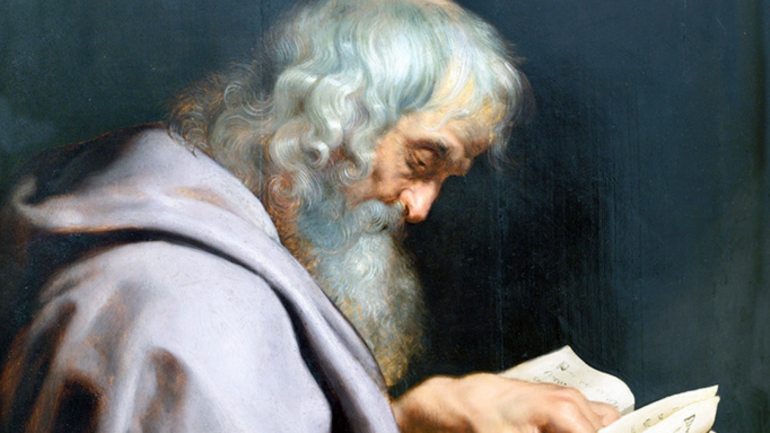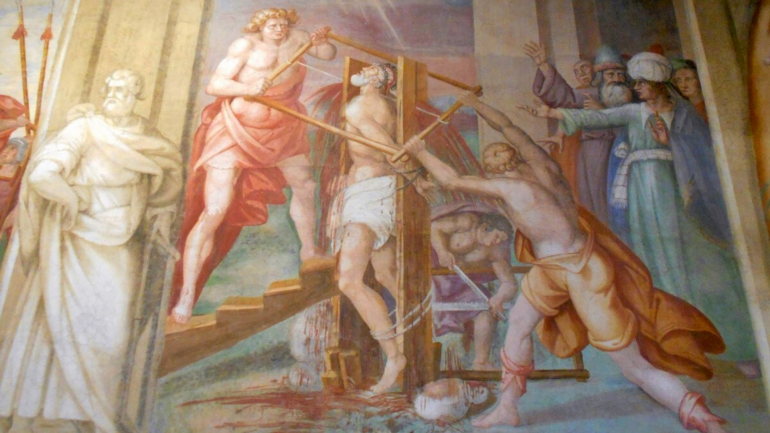Simon the Zealot: “TURN”ing New Leaf

October 28th, the Church honours two often over-looked apostles: Simon the Zealot and Jude. Jude while remembered as a saint for hopeless cases, Simon’s journey as an apostle is largely undocumented, leaving room for creative and theological reflection. His story speaks powerfully to us in this age where so much violence prevails all around us. Known as “the Zealot” suggests him to have been associated with a violent revolutionary movement (Luke 6:15). This movement sought to overthrow the Roman occupation of Palestine through force. Yet this man, whose hands may once have clutched a dagger, learned to carry the Gospel. Instead of wielding a sword for a temporal kingdom, Simon embraced the cross for an eternal one.
To understand how dramatically Simon changed, we need to picture the world he lived in. First-century Judea was ready to explode. The Zealots weren't an official organization, they were more like a movement of passionate Jews who mixed deep religious faith with fierce love for their nation. They emerged because Rome occupied their land, and they saw foreign soldiers controlling God's people as an insult to everything they believed.
Looking back to heroes like the Maccabees who had fought off Greek invaders generations earlier, the Zealots believed fighting back wasn't just permitted, it was what God wanted. Their dream was powerful: An Israel free from foreign control, where God's law ruled and no pagan army dared set foot in their holy city. They started with protests and disruption, but eventually turned to violence. This rage would explode into full-scale war ending with Jerusalem destroyed and their Temple in ruins.
If Simon was called "the Zealot," he probably carried this same burning anger. We can imagine an angry young man whose blood boiled every time Roman soldiers marched through his town. His world was black and white: you were either faithful to God or a traitor, either fighting for freedom or collaborating with the enemy. Everything felt urgent. Everything demanded action. This kind of intensity, even when it comes from genuine faith, keeps a person constantly on edge, ready to judge, quick to suspect, always looking for who's on the wrong side. If Simon emerged from this era, his transformation under Christ becomes nothing short of miraculous, and profoundly relevant.
Jesus didn't simply ask him to exchange one ideology for another, or to redirect his passion toward a "better" political cause. He invited Simon into something far more disorienting: a kingdom that arrives not through force but through surrender, not by defeating enemies but by loving them. Imagine Simon's confusion when Jesus taught, "Love your enemies, pray for those who persecute you." This wasn't political strategy, it was complete upheaval of everything Simon thought he knew about establishing God's reign. To imagine Simon sitting beside Matthew, a former tax collector for Rome, is to glimpse the miracle of grace that Jesus created within his band of disciples. Once enemies divided by politics, they became brothers united in mission.

Simon the Zealot’s story is relevant today because it feels so familiar. Around the world, people are caught up in conflicts, intense nationalism, and bitter political divisions. Many of us justify our anger toward other nations or groups by wrapping it in moral or religious language telling ourselves we're on the right side. Social media makes it worse. It turns ordinary Christians into warriors fighting "us" versus "them", whether the enemy is another country, a different political party, or people who think differently than we do. We hold onto our political beliefs as fiercely as any Zealot held his weapon, convinced that if we just defeat the other side, justice will finally come.
As we reflect on Simon's dramatic journey from revolutionary to apostle, we can distill his transformation into a simple framework that speaks directly to our modern struggles. The acronym TURN captures the essential movement of his life—and the invitation Christ extends to every zealous heart today.
T - Trust Christ's methods, not violence
Simon learned that violence, whether physical, verbal, or ideological, never brings true peace. Jesus taught something radically different: "Love your enemies and pray for those who persecute you" (Matthew 5:44). This requires deep trust. We want quick victories and defeated opponents. But Simon discovered that Christ's way of sacrificial love, though it looks weak, transforms hearts far more powerfully than any weapon. The question remains: Will we trust Jesus enough to abandon force?
U - Unleash Mercy, Not Judgment
Simon saw the world in black and white: traitors deserved death, compromise meant weakness. But Jesus shattered this view. Simon watched Him eat with sinners (Luke 15:2), spare an adulteress, "Let anyone without sin throw the first stone" (John 8:7), and pray from the cross, "Father, forgive them" (Luke 23:34). Today we quickly cancel and condemn. Simon's story challenges us: Can we offer mercy instead of judgment?
R - Redirect zeal into holy purpose
Jesus didn't kill Simon's passion, He redirected it. The fire that once fueled violence now powered Gospel mission. Simon spent himself making disciples across distant lands, not destroying enemies. Christ specializes in this: taking our misdirected intensity and converting it into holy purpose. Our passion isn't the problem; our target is. Will we let Jesus redirect our zeal from political warfare to kingdom work, from defeating opponents to reaching the lost?
N - No earthly cause replaces Christ's kingdom
Simon's journey reminds us that no political movement, however righteous its goals, can substitute for Christ's kingdom. Every earthly cause, even good ones, will disappoint when we treat it as ultimate. Christ alone satisfies our deepest longings for justice and peace.
Thus, Simon’s transformation challenges us to examine our own “zealotries.” Are we clinging to ideologies that divide, or are we open to Christ’s call to unity? In an age of violence which often drowns dialogue, Simon’s story suggests that true transformation begins with encounter, meeting Jesus in prayer, Scripture, or the Eucharist, and requires humility to let go of our need to “win.”








